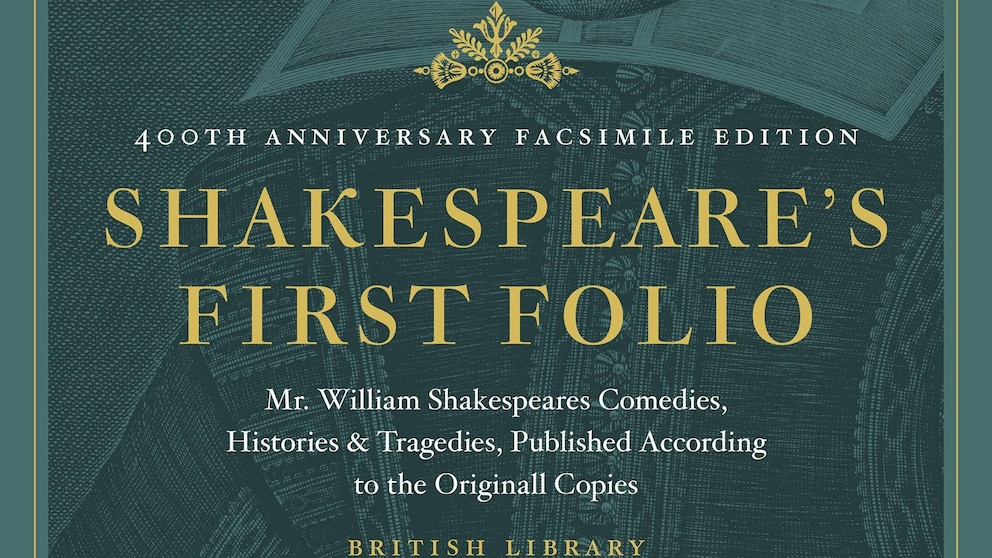
NEW YORK — On the 400th anniversary of Shakespeare’s First Folio, rare originals are being displayed and publishers are offering collectors editions of Shakespeare’s plays, including one that sells for $1,500.
Scholars believe that between 200-300 copies still survive from the late 1623 release of “Mr. William Shakespeares Comedies, Histories & Tragedies.” Presided over by two friends and former colleagues of Shakespeare, who had died in 1616, the Folio ensured that lasting texts existed for “Macbeth,” “Twelfth Night” and other cornerstones of Western literature. In Shakespeare’s lifetime, many of his works were unpublished or available only in cheap paperback editions.
“Without the First Folio we would have lost a world of words,” Gregory Doran, artistic director emeritus of the Royal Shakespeare Company, writes in the introduction to “The Complete Plays” of Shakespeare, a new publication.
First folios have been on exhibit everywhere from the British Museum to the New York Public Library and at least two major book projects will mark the anniversary.
The British Library is collaborating with Rizzoli Books in New York on “Shakespeare’s First Folio: 400th Anniversary Facsimile Edition,” contained within a slipcase cover. With a list price of $135, the book is 928 pages and includes an introductory booklet co-written by Adrian Edwards, head curator of the British Library’s Printed Heritage Collections.
The most ambitious, and exclusive project, is “The Complete Plays,” a limited edition from the Folio Society, an employee-owned company in London that puts out customized volumes ranging from “Beowulf” to George R.R. Martin’s “A Song of Ice and Fire” series. The Society has printed just 1,000 copies of the 3-volume box set, with a list price of $1,500. Besides Doran’s introduction, the Folio Society release includes a foreword by Dame Judi Dench. Each set is hand-numbered by illustrator Neil Packer.
More than three-quarters of “The Complete Plays” have already sold, according to the publisher.
“In an era when everything seems disposable, I feel like there’s a good market for fine editions of classic books,” says Folio Society publishing director Tom Walker.
The First Folio was daring, even audacious for its time, when such publications were “reserved for learned treatises, hefty genealogical texts, books of religious or historiographical importance, or even works by monarchs,” according to Shakespeare scholar Chris Laoutaris. Before Shakespeare the only playwright known to have been so honored was his contemporary Ben Jonson, who honored himself by overseeing “The Workes of Benjamin Jonson” in 1616. While the British Museum edition is relatively affordable, the Folio Society’s production is closer to the intended market for the original release.
“Only those with deep pockets, and the space to read them, could afford such luxurious products,” says Laoutaris, an associate professor at the Shakespeare Institute in the playwright’s native Stratford-On-Avon and author of “Shakespeare’s Book: The Intertwined Lives Behind the Fist Folio,” which came out this year. “When it was released, the First Folio cost more to produce than any other collection of plays in history up until that point.”
The Folio proved successful enough that an updated edition, the Second Folio, was published in 1632, a Third Folio in 1663 and a fourth in 1685. By the 19th century, the original Folio was becoming a valued piece of history, in part through the efforts of collectors Henry and Emily Folger, and a symbol of might for the British Empire. Sir George Grey, who had served as a colonial governor, established libraries worldwide that included copies of the First Folio.
“For Grey, the First Folio represented the pinnacle of culture, but specifically English culture,” Laoutaris says. “He sought nothing less than the obliteration of the language and culture of the native populations in Australia, New Zealand and South Africa, nurturing a desire to replace these with the English language and its literary products.”
The United States is home to more than half of all existing copies of the First Folio, followed by the United Kingdom and Japan, with handfuls of editions also existing in Germany, France, South Africa, Australia and New Zealand among other countries. For antiquarians, the First Folio is the greatest of prizes: One sold for $9.9 million in 2020. For scholars and countless admirers, the Folio is secondary to the plays themselves.
“Shakespeare’s stature, for the past 400 years, is a reflection of his plays’ staying power on the stage far more than their survival in a collected works,” says James Shapiro, a professor of English and comparative literature at Columbia University and author of several books on Shakespeare.
“You can buy a Ben Jonson folio for a few thousand dollars; a Shakespeare folio will cost you millions. The reason for this simple: the remarkable afterlife of his comedies, histories, and tragedies in theaters throughout the world.”
